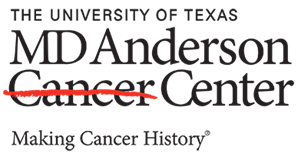


MD Anderson Cancer Center was created by the Texas Legislature in 1941 as a component of The University of Texas System and is one of the original National Cancer Institute’s designated Comprehensive Cancer Centers.
M. D. Anderson Cancer Center is recognized as No. 1 in cancer care in U.S. News & World Report's annual "America's Best Hospitals" survey, in part due to our FACT accreditation. The Cancer Center is Magnet credentialed with recognized nursing excellence, and it is recognized by the National Marrow Donor Program (NMDP) as a specialized center for matched unrelated donor transplants.
The M. D. Anderson Cancer Center Stem Cell Transplantation and Cellular Therapy Program was one of the first organizations accredited by FACT, receiving our first accreditation in January 13, 2000. It is home to FACT organization leaders including Elizabeth J. Shpall, M.D.,first FACT President and Richard Champlin, M.D., first FACT Vice President.
The M. D. Anderson Cancer Center Stem Cell Transplantation and Cellular Therapy Program completed four FACT reaccreditations. Many M. D. Anderson Cancer Center Stem Cell Transplantation and Cellular Therapy Program faculty and staff serve on the FACT Board of Directors and committees, and are clinical, collection, and laboratory inspectors, supporting the organization’s values and mission to set a global standard in quality stem cell transplantation and cellular therapy care.
The process of FACT accreditation is an important learning and organizational experience for every transplant program. The M. D. Anderson Cancer Center Stem Cell Transplantation and Cellular Therapy Program’s first FACT accreditation required a thorough review of all our clinical, collection, and laboratory practices and policies, using an interdisciplinary approach, integrating processes throughout the program, setting new standards, and refining old ones. FACT accreditation demonstrates M. D. Anderson Cancer Center’s commitment to outstanding quality patient care and compliance with international quality standards.
Lessons are learned with each new set of standards and with each reaccreditation process. Institutional administrative and clinical management are key in successful accreditation and compliance. They have been involved from the beginning in the accreditation preparations and maintenance of our quality management program standards, including infection control, transfusion, laboratory medicine, radiation oncology, and institutional quality management.
Planning and preparation in advance is critical as suggested by the FACT accreditation timeline. The process can take longer than you can think and the more you prepare in advance, the better. Inspection preparation, more importantly continued standard compliance, is best accomplished under the direction of a designated quality person and team, with representatives from the transplant program’s clinical, cell collection, and cell processing groups.
Documentation and organization are key factors. Even with the implementation of the electronic application and inspection checklist, documentation is key during the inspection process. Having the documentation well organized to the standards will make for a smooth inspection.
Quality, Quality, Quality is the new standard. Development and implementation of an excellent quality management program including clinical, collection and processing is essential. Developing a good quality plan, the document that describes the quality program and addresses all of the key functions FACT includes in the quality management standards section, is key. The quality plan will provide structure to your quality management program.
Don’t forget to contact your FACT accreditation coordinator and reach out to other institutions who have been accredited by FACT for advice and help in preparation.
Our goal is the same, outstanding quality patient care in stem cell transplant.
The Stem Cell Transplantation and Cellular Therapy Program at M. D. Anderson Cancer Center is an adult and pediatric autologous and allogeneic transplant program that began in 1979 and is internationally recognized as a leader in research and treatment. It is one of the largest transplant centers in the world performing over 800 transplant procedures each year, consisting of an integrated interdisciplinary medical team, a 98-bed inpatient unit, and multiple outpatient centers. It has one of the largest and most active Apheresis Centers in the world, collecting over 1600 HPC, Apheresis collections and performing over 1900 photopheresis procedures a year. It has a nationally and internationally recognized advanced Cell Therapy Laboratory (CTL) with a state-of-the-art Good Manufacturing Practices (GMP) facility with class 10,000 suites processing over 2400 products a year.
The mission of the Stem Cell Transplantation and Cellular Therapy Program is to utilize hematopoietic cell therapies to eliminate cancer and allied diseases in Texas, the nation, and the world, through integrated quality programs in patient care, research, education, and prevention. The primary goal of the program is to provide cutting edge medical care and improve upon current treatments. Novel therapeutic approaches being investigated at M. D. Anderson Cancer Center often will become the "standard of care" utilized throughout the country and the world.
Disclaimer: The opinions expressed here are solely the views of the writer and do not necessarily reflect the views and opinions of the Foundation for the Accreditation of Cellular Therapy.
FACT accredited organizations are encouraged to share their success stories and be featured on the FACT website. Your FACT accreditation attests to the high quality of your organization, and we invite you to share some of your program improvements, and additional benefits gained throughout the accreditation process. Access the submission form using the button below. If you have any questions, please email us at fact@factglobal.org.